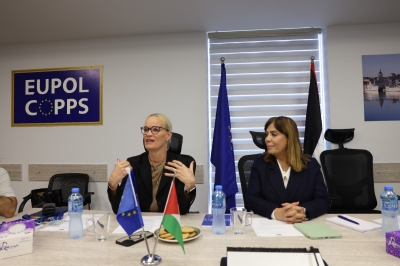News

Continuing dialogue and Building Bridges among Palestinian criminal justice actors
To further enhance the capacity and cooperation amongst criminal justice actors, particularly at district level, EUPOL COPPS brough together representatives from the Palestinian Civil Police (PCP), the Public Prosecutor’s Office, Judges from First Court of Jericho and lawyers, in Jericho, where a workshop was held on The 15 January 2026. The workshop focused on addressing issues such as how to improve backlog issues in the criminal justice chain on district level and how to enhance efficiency in providing justice services to the Palestinian communities. The workshop provided an opportunity to share professional experiences among the attendees through interactive round-table discussions exchanges of views. The workshop is part of a continuous and coherent effort to build up on experience. Similar events on which the Jericho workshop expands, took place last year in Bethlehem and Salfit districts. The aim is to enhance efficiency and cooperation between the criminal justice actors as to overcoming overcrowding of cases (backlog) with practical internal, doable here & now solutions, seen from district perspective. EUPOL COPPS advocates for access to justice as one of the main pillars in rule of law and Human Rights. In this respect, fighting backlog is a key factor. The discussions culminated in a roundtable session during which participants agreed on cooperation strategy.

Improving capacity and awareness of Palestinian Civil Police on management skills, strategic planning, Human Rights & legal frameworks
To improve the capacity and awareness of Palestinian Civil Police (PCP) officers in the areas of management skills, strategic planning, human rights and legal frameworks related to police work, including criminal investigation, Family and Juvenile Protection Department and Community Policing, EUPOL COPPS organised a two-day workshop in Jericho in the period on 13-14 January. The event was marked by interactive discussions encouraging active participation and the exchange of professional experiences among attendees. The sessions, aimed to strengthen leadership competencies, improve strategic thinking, and promote best practices aligned with international standards, mainly focused on Community Policing, Family Juvenile Protection, Correction and Rehabilitation Centres, Criminal Investigation Department, Crime Scene Management, Leadership, protection and preservation of evidence, and methodologies for conducting effective and lawful investigations. The workshop also built on the experience of previous similar events held in the Bethlehem, Jericho, and Salfit districts. The importance of Human Rights mainstreaming in policing, including by highlighting relevant legal frameworks and how human rights are applied in police contexts, and accountability in the conduct of police operations were emphasised during the workshop. The discussions culminated in a roundtable session where the attendees identified future training requirements and cooperation.

Strengthening Palestinian Civil Police capacity on trust building
Building trust between the police and the public is fundamental for communities to be safer and stable. To support the Palestinian Civil Police (PCP) strengthening public stability and to enhance respect of public freedoms, EUPOL COPPS organised a workshop in the northern West Bank town of Salfit on 16-17 December. The event brought together EUPOL COPPS Advisers, including the Mission’s Human Rights Office and over 30 Palestinian senior police officers. The workshop focused on improving the capacity and awareness of the PCP in Management Skills, Strategic Planning, Human Rights & Legal Frameworks, Criminal Investigation and Community Policing. EUPOLCOPPS advisers facilitated interactive discussions with participants on the named topics. EUPOL COPPS advisors shared real life examples of practical management tools to improve team motivation, operational efficiency, and early problem detection in daily policing. The topics were discussed through concrete examples during interactive group exercises, so that participants could identify actionable changes for their duty stations. The workshop marked the importance of continued cooperation and dialogue between EUPOL COPPS and the PCP.

Palestine launches Harmonisation Manual to align national laws with international conventions
In Palestine like in the EU member states, harmonising laws with the highest international standards make a real difference in people’s daily lives, guaranteeing justice, equality, and dignity. To strengthen the alignment of Palestinian legislation with the highest international standards, EUPOL COPPS has been supporting the Palestinian Harmonisation Committee. As a result, a new Harmonisation Manual aiming to ensuring conduct of compatibility checks of draft laws to render the legislative process more coherent, efficient, and transparent, was launched on 15 December, in Ramallah. Palestinian government officials, diplomats, and civil society representatives gathered on the occasion. The Palestinian Minister of Justice, Sharhabeel Al-Za’eem the Palestinian Deputy Minister of Foreign Affairs, Omar Awadallah, and EUPOL COPPS Head of Mission (HoM), Karin Limdal, opened the event. The Palestinian Minister of Women Affairs, Mona Al-Khalili, also attended. On the occasion, the Palestinian representatives emphasised the need to enhance legal coherence and reinforce Palestine’s adherence to international conventions. Underlying how an important milestone in our collective efforts to strengthen the alignment of Palestinian legislation with international obligations, EUPOL COPPS HoM recalled that the Mission has been supporting the Harmonisation Committee since its establishment in 2017. But she pointed out that harmonising legislation is not the sole responsibility of the Committee and that the Manual should be used actively by all legal officers across all ministries and legal departments, enabling them to undertake the essential legal and compatibility checks before draft laws reach the Committee. In that regard, HoM outlined the importance of the document being endorsed by the Council of Ministers.
One of Us
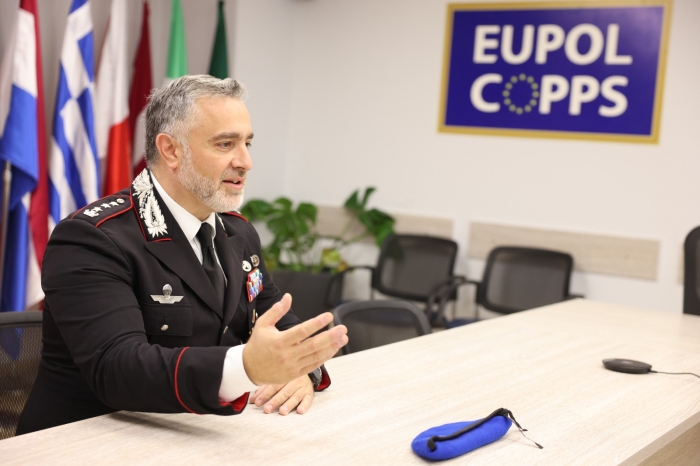
Roberto Arcieri – Head of Operations
In his early teens EUPOL COPPS Head of Operations, Roberto Arcieri, already envisaged he would wear a uniform as a grown-up. Being born in 1973 and raised in the ancient Grumo Appula, founded in Roman times and part of the Alta Murgia National Park in Southeastern Italy, Roberto grew up observing at close range the difference between good and bad, which translates into the State and its enemies. The organised crimes generally known as the mafia, was at the time active primarily in the South of the Italian peninsula, yet, moving its tentacles within transnational business and corruption. Exemplary Italian institutional figures like anti-mafia judges Rocco Chinnici, Giovanni Falcone, Paolo Borsellino, and Carabinieri officers like General Carlo Alberto Dalla Chiesa, Lt. Col. Russo, Cap. Basile paid with their lives their long-lasting fight on organised crime. They all died in the line of duty to defend the principles of legality, justice, freedom, equality, and dignity, by opposing the criminal power that threatens democracy. The ultimate sacrifice of some fellow Italians has been the game changer for Roberto, who picked the right side of the law joining the Italian Carabinieri (one of Italy’s primary law enforcement agencies, distinguished by their military status and broad range of responsibilities both domestically and internationally) at the age of 19. Being a Carabiniere has meant Roberto to be constantly on the move, either in his country, or abroad. “I was never in the same place for more than four years” says Roberto, who nevertheless managed to raise two children, now young adults, together with his wife. Roberto, who has the rank of Colonel, joined EUPOL COPPS last year, but he was not new to Palestine, as he was already here working for Carabinieri MIADIT (Missione Addestrativa Italiana) Mission in the framework on the US State Security Coordination (now Office of the Security Coordinator - OSC) coalition. Prior to that he has worked in various capacities, in different Italian regions fighting common and organized crimes, in international engagements in Bosnia Herzegovina, Eritrea, Kosovo, Afghanistan, Mali and also in Brussels, Belgium, focusing on African issues. As a EUPOL COPPS Head of Operations, leading colleagues working to support Palestinian justice and civilian security sectors, Roberto feels the experience changes him every day. The keyword in the Palestinian context is “flexibility” says Roberto, who strives to find solutions to the continuous challenges faced by the Palestinian counterparts the Mission is mandated to support, and for EUPOL COPPS itself. An approach certainly appropriate given the uncertainty facing Palestine and the wider region at this very moment.
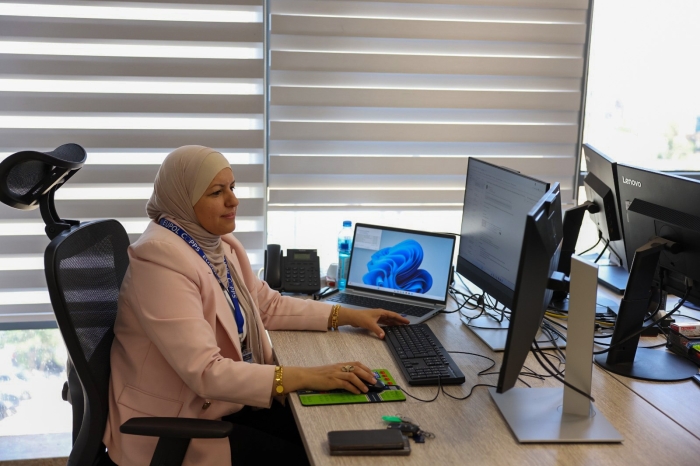
Khadija Aldeek
When EUPOL COPPS Financial Verification Officer, Khadija Aldeek from Palestine, sits down at her desk, she does not just see numbers on spreadsheets or invoices; she sees the foundation of trust that holds the entire mission together. At EUPOL COPPS, the Birzeit University accounting graduate reviews transactions to ensure they are in line with EU rules, related internal policy and international best practices. Having worked with international organisations and with major Palestinian companies, she brings international know-how together with local knowledge to her job. For Khadija financial verification is not a box-ticking exercise, but a necessary step towards accountability and transparency. She sees it not just as a rule to be followed, but as a safeguard—a way of making sure every euro is spent as it ought, of building trust, and of keeping the Mission's financial systems secure. In the seven months she's been working at EUPOL COPPS, she has made a real impact. Her influence extends beyond paperwork. She is a valued mentor to colleagues across departments, helping to clarify on procedures and best practices. "I don't merely point out mistakes, I also show how to prevent them," she says. "My goal is to enable others to do better when following EU financial rules." Her no-nonsense, calm approach has also made her a source of contact for employees who are struggling with money matters. She's made many see this work differently, transforming it from a chore into a chance for development and learning. "Done correctly, financial verification protects the entire organisation. It's not just about finding mistakes—it's a matter of trust-establishment, system-strengthening, and knowing that every decision is being made on the foundation of accurate, verified information," she says. With her integrity, professionalism, and enthusiasm, Khadija Aldeek isn't just implementing financial regulations—sews a culture of accountability and trust, one transaction at a time, says Khadija, a dedicated mother of three, balancing family and career with discipline and focus.
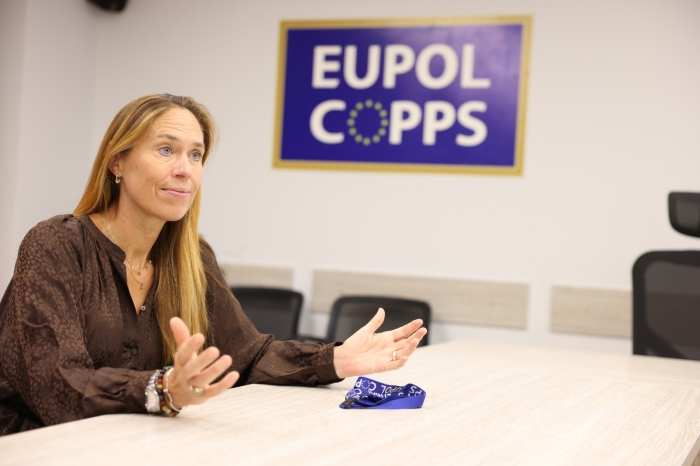
Maria Ek Odsjo
Our deputy Head of Justice Unit, Maria Ek Odsjo, is a senior judge in her mid-50s. In Sweden, where she comes from, she has for the last years extensively been working on asylum and security related cases, including dealing with individuals arriving from then ISIS ruled Syria and Iraq. The cases she was presented with, reached Maria through the criminal justice chain, having been dealt with by the Swedish police before arriving on her desk.. Her latest role in the Swedish justice system was to lead and manage the work of around 45 legal professionals. Each of them had cases to solve. Maria had the overall oversight and also, depending on the situation, the responsibility to approve asylum, . This has exposed Maria with a wide range of people coming from parts of the world she had never travelled to. In other words, she had the opportunity to get to know different cultures through human and professional interaction doing her job in Stockholm. Asked when and how the decision to be a judge appeared on her life horizon, Maria answers that this happened during her time as a young law clerk in a small town in her homeland. Having always been interested in society and political science, Maria initially chose law for her university studies with the initial attitude of “giving it a try”. She explains that she “very much liked both criminal and civilian proceedings, as well as social law”. Much later, as an experienced professional, Maria represented Sweden in Brussels, working at the Swedish Permanent EU Representation with law drafting. The choice to join EUPOL COPPS and come to Palestine is partly linked to her experience in dealing with many cases involving people from the Middle East.. “I wanted to experience the culture firsthand, meet the people, to see for myself what it looks like, to experience what it means to walk through Damascus Gate in the daylight and at night. Now that I can do it, I know what an amazing feeling it is to pass by this special place. This means something special to me and has taught me something essential about different life conditions. When Maria first joined the Mission, she was a Senior Justice Advisor advising her Palestinian colleagues on court proceeding related matters. She had the possibility to learn from her Palestinian colleagues and share her own experiences from her own professional career. Working in an international environment such as an EU Mission is also somehow life changing, indicates Maria. “In my current role, I strive to support my colleagues in solving challenges and problems, when these occur. With the counterparts I now see my role as a way of giving my contribution to advancing Rule of Law in Palestine”. Among the milestones carrying a personal touch during her career as a judge, Maria recalls the time she had a case of a Palestinian family coming from Iraq exposed to a very difficult situation where she contributed to them being granted asylum on the basis of the need for education of their young children aged 10 and 12. As every new experience in life produces a change in each of us, working in Palestine has made Maria, as she explains, a bit humbler as an individual, more understanding of difficult situations, having had the chance to see these firsthand. The realisation of having an EU-passport appearing “privileged” compared to others, for example Palestinians (many can’t even have one), is also a humbling experience, says Maria, who has observed what happens at border crossing points like the Allenby Bridge (border between Israel and Jordan, editor’s note), seeing the difference of procedures occurring according to the kind of documentation provided. “I now understand a lot more things about the people from the Middle East I met in my country” says Maria. When thinking about the time when she will be returning to Sweden, Maria believes her experience in Palestine will make her a better judge. Although, she said, I think I would prefer to have further experiences in CSDP Missions after Palestine before returning to be a judge in my country. She has pinned Ukraine on the map, where a sister EU Civilian CSDP is deployed, however that will have to wait as there still so much to do here to support Palestine.

“I want to be one of them”, said 4-year-old Anu pointing at a police car
Looking out of the window at her grandparents’ house in the town of Pori, Finland, Anu Aro, asked her grandma what that was pointing the finger at a police car. “I want to be one of them”, said the then 4 years old Anu. It was the winter of 1974. By the age of 23, after having spent a sabbatical in Cyprus (1989-1990) working as au pair, Anu joined the Finnish Police, getting first a Diploma in Police Studies, then a Bachelor in Police Command Examination, and a master’s degree in Social science studies from Universities in Finland. Whilst working and studying, Anu had 3 daughters, now age 30, 28 and 22. At present, while deployed as a Finnish secondee at EUPOL COPPS as Senior Police Advisor in Training, Anu is about to finish another master’s degree in security and risk management criminology at the University of Leicester, in the UK. EUPOL COPPS is not the first international mission for Anu, as she consecutively worked in international missions as of 2104. She served in Afghanistan (EU and GIZ/German cooperation), Liberia (United Nations) and Somalia (EUCAP Somalia). Asked “why” EUPOL COPPS at this stage of her personal and professional path, Anu recalls that this very Mission was the first she ever applied for in 2012. “I was the second-best candidate” says Anu, explaining that she opted for Afghanistan, to later discovered later that the selected competitor for Palestine did not go in the end. Therefore, when recently a possibility materialised to join EUPOL COPPS it felt for Anu like closing a circle, so she applied for the position she now covers, explains Anu. Another reason for joining EUPOL COPPS, continues Anu, is the fact that she is “a person constantly working on self-development and self-education, passionate about history”, always eager to see with her own eyes about the situation on the ground in Palestine, which she read about for long time. When discussing about the challenges that a woman, a mother, can face about the choice of joining a Mission, Anu says: ‘When I went to my first Mission my youngest daughter was 12. It was possible for me to go to know everything was fine at home, as I had a good agreement with her father. Anu reveals that at time she felt criticized by some of her male colleagues in the Finnish police for her choice to go leave her children to go to Missions . “The advice I would give to women willing to be deployed in Missions is to ignore other people’s opinion. Of course you change your life, so you might lose some friends because there is less time to spend together”. Anu underlines the importance of the quality of time she had and has with her daughters when serving in Missions, like going on holiday together. She also recalls hard moments as several times she fond herself under attack in Afghanistan, having to spend up to 16 hours in a bunker, with all the consequential difficulties in communication with her family. “I always called my daughters from the bunker where I sheltered with my colleagues to reassure them. I have always tried to inform them about everything because things go so fast to the news nowadays and I want them to get the first information from me instead of reading it from the internet”. Talking about her daily work at EUPOL COPPS Anu explains that she finds out about what kind of trainings are needed by the Palestinian Civil Police, focusing also on Gender mainstreaming. She tries and find out for example why women do not attend certain training activities and what should be done about it. “Nowadays Palestinians are willing to send their daughters to train as police officers, also as a source of income for the family, but at the same time there are worried about their safety”. Anu recognises that her long-term experience in many crisis areas makes her “a very different person than before”. “I see the difference between me and people that have had similar life and professional experiences and the ones back home that have not” says Anu. “For example, at home people debate about politically correct wording of things, or topics that looked at from other parts of the world frankly look irrelevant”. The woman who aged 4 knew she would wear a police uniform, concludes: “my observation is that in wealthy countries people easily see small things as a problem, unlike in places where people have worries about bringing food on the table and have to walk long hours for water or to reach the workplace”.]
Follow us on Social Media






Videos
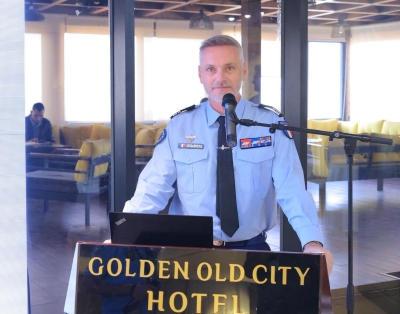
EUPOL COPPS and Palestinian Police hold Community Policing workshop in Nablus
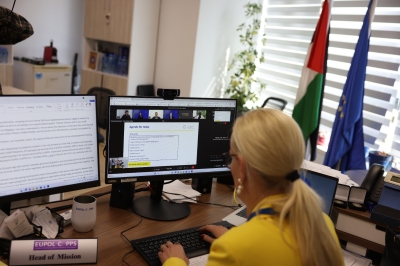
Women’s participation in EU Civilian Crisis Management Missions is vital for inclusive and sustainable peace
